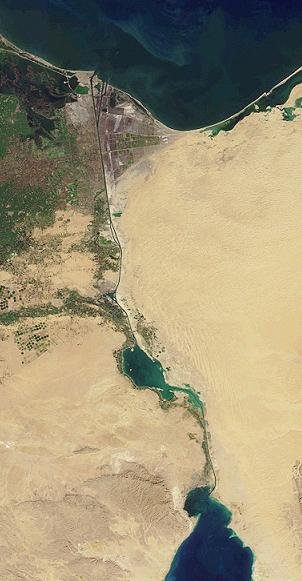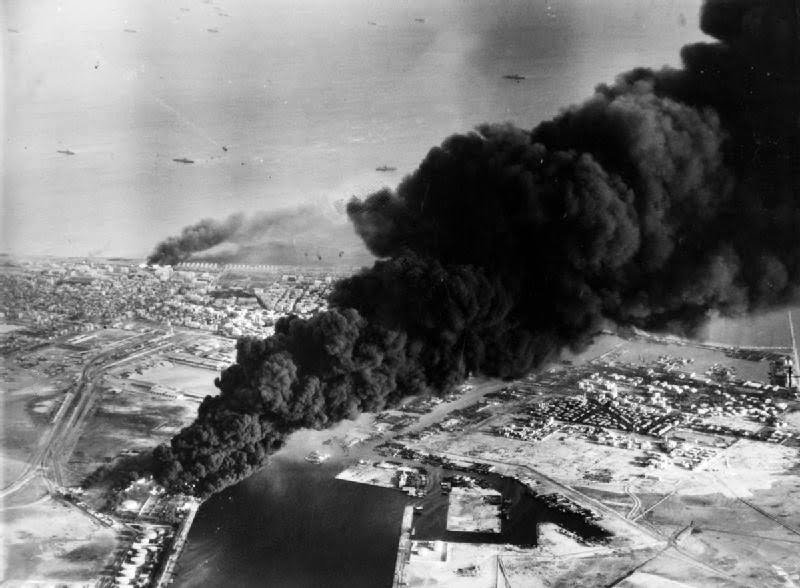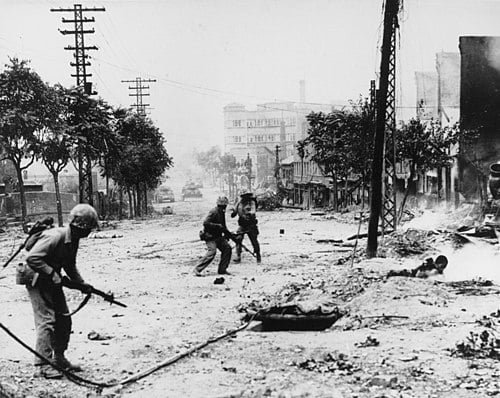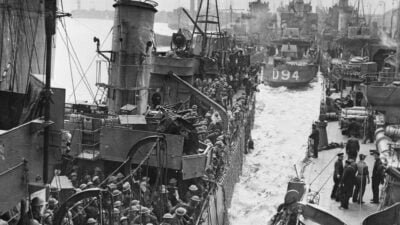The Suez Canal Crisis was a crucial milestone in 20th-century geopolitics, impacting not only the relations between nations but also redefining roles and alliances on the international stage.
Also check out: The Complex Trajectory of the South Korean War
Nexus of Trade and Geopolitics
The Suez Canal, located in Egypt, is a historical landmark that played a crucial role in global connectivity and geopolitical dynamics, shaping trade and international relations.


The Birth of the Canal and its Commercial Significance
The construction of the canal was a monumental achievement. Completed in 1869, it provided a direct route between the Mediterranean Sea and the Red Sea, substantially shortening the maritime journey between Europe and Asia. This connection allowed for faster transit of goods, saving weeks of travel compared to the route around the Cape of Good Hope in Africa.
It became a valuable strategic asset due to its geographical location. Controlling this route meant not only dominating trade but also having faster access to the riches of the East and later, oil from the Persian Gulf, becoming vital for European economies.
Colonial Domination and International Control
Initially, control of the Suez Canal was held by French and British interests, reflecting the colonial era. With the increasing independence of Middle Eastern countries and the rise of nationalism, issues regarding control of the canal became a source of tension between Western nations and nations in the region.
The canal not only facilitated the transportation of goods but also played a significant role in developing global trade routes. Its strategic importance extended beyond the commercial sphere, influencing international diplomacy and global security.
The Critical Point of the Suez Canal Crisis
The crisis in 1956 was triggered by the nationalization of the canal by Egyptian President Gamal Abdel Nasser and resulted in a coordinated military response by the United Kingdom, France, and Israel.


Nationalization of the Suez Canal
In 1956, Egyptian President Nasser nationalized the canal, previously controlled by British and French interests. This decision challenged European control over the canal and was a turning point in the conflict between Western nations and Middle Eastern nations.
Joint Military Response to the Suez Canal Crisis
In response to the nationalization of the canal, the United Kingdom, France, and Israel coordinated a secret military intervention. The operation was planned to regain control of the canal and depose Nasser, under the justification of restoring the security of the maritime route and containing growing tensions in the region.
The joint military intervention was condemned internationally. Both the United States and the Soviet Union opposed the action, fearing an escalation of the conflict and concerns about the global balance of power. International pressures forced the invading nations to reconsider their actions.
International pressure and the threat of a broader war led to the withdrawal of British, French, and Israeli forces. The situation was resolved with the acceptance of a UN peacekeeping force, which oversaw the canal and reinstated freedom of navigation, ensuring its neutrality.
International Pressures and Resolution of the Suez Canal Crisis
The crisis was characterized by intense international pressures that shaped the resolution of the conflict, resulting in an outcome that had a significant impact on the global balance of power.


International Condemnation and Superpower Intervention
The joint military action by the United Kingdom, France, and Israel was immediately condemned by the international community. Both the United States and the Soviet Union opposed the intervention, concerned about the escalation of the conflict and the impact on international relations.
Both the U.S. and the Soviet Union exerted significant pressure on the invading nations. The U.S. threatened to cut economic aid, while the Soviet Union warned of possible military interventions. These threats forced a reconsideration of actions.
Meetings and Peaceful Resolution
International pressure and the threat of a wider war led the involved nations to seek a peaceful resolution to the crisis. Diplomatic meetings were held, and a solution was sought to avoid an escalation of the conflict. To resolve the crisis, the withdrawal of British, French, and Israeli forces was agreed upon, and the acceptance of a UN peacekeeping force to oversee the canal was reached. These peacekeeping forces ensured the neutrality of the canal and freedom of navigation.
Geopolitical and Diplomatic Transformations
In addition to its immediate repercussions, it left a lasting legacy that influenced geopolitical and diplomatic dynamics on a global scale.
Decline of European Influence in the Middle East
The crisis marked a significant decline in European influence in the Middle East. The joint military action was interpreted as an attempt to restore colonial dominance, leading to widespread backlash. The crisis was a crucial moment that highlighted the emergence of the United States as a key arbiter in international relations. The U.S.’s opposition to military action was a turning point that reinforced its position as an influential power and advocate for global peace. The crisis also affected the Soviet Union, which threatened military intervention. This demonstrated its determination to challenge Western powers, affecting the balance of power and highlighting the rivalry between superpowers.
UN Diplomacy and International Politics
The resolution of the crisis through the establishment of UN peacekeeping forces represented a milestone in international diplomacy. It reinforced the role of the UN as a mediator in international conflicts and underscored the importance of diplomacy in dispute resolution.
The Suez Canal Crisis marked a fundamental transition in international relations, altering the balance of power and how nations conduct their foreign policies. Its legacy echoes in contemporary diplomacy and geopolitical dynamics, emphasizing the importance of diplomacy and dialogue in conflict resolution and the maintenance of global stability.













